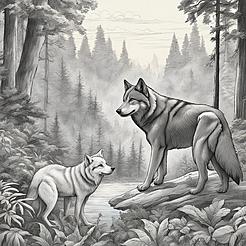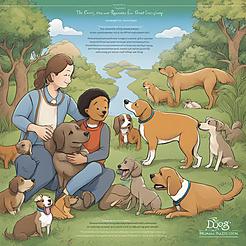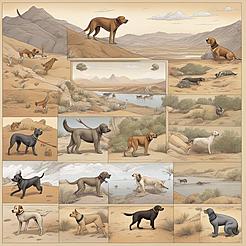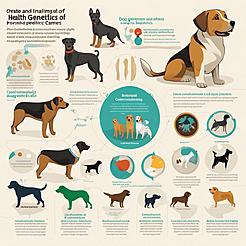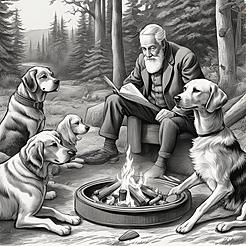 henrydjacob
henrydjacob- Chapter
- 2024-04-15

In the intricate tapestry of the dog's journey, where human influence intertwines with the forces of natural selection, lies a fascinating realm waiting to be explored - the canine mind. A world of instincts, emotions, and intelligence that defines the behavior of our beloved companions, reflecting the echoes of their genetic heritage through the lens of evolutionary psychology.
At the core of understanding the canine mind is the recognition that dogs, despite their domestication, still carry within them the primal instincts of their wild ancestors. From wolves to the diverse array of modern breeds we cherish today, the behaviors exhibited by dogs are deeply rooted in their evolutionary history. Just as selective breeding has shaped their physical attributes, it has also influenced their cognitive processes and behavioral tendencies.
One of the most intriguing aspects of the canine mind is its capacity for social cognition, a trait that has been honed through centuries of cohabitation with humans. Dogs possess a remarkable ability to interpret human gestures, facial expressions, and vocal cues, forming a unique interspecies communication bond that transcends language barriers. This innate skill, often referred to as "theory of mind," allows dogs to understand and respond to human emotions, demonstrating a level of empathy and social intelligence that sets them apart from other animals.
The evolutionary roots of this social cognition can be traced back to the cooperative hunting behaviors of wolves, where communication and collaboration were essential for survival. Over time, as wolves evolved into domesticated dogs and formed close bonds with humans, these social cognitive abilities were further refined, leading to the remarkable interspecies relationship we witness today. Dogs not only respond to our emotional cues but also form complex social hierarchies within their own packs, mirroring the dynamics of their wild ancestors.
As we delve deeper into the canine mind, we encounter a rich tapestry of behaviors that offer insights into the evolutionary psychology of dogs. From the playful antics of puppies to the protective instincts of adult dogs, each behavior serves a specific purpose rooted in their genetic makeup. The act of tail-wagging, for example, is not merely a sign of happiness but a multifaceted form of communication that conveys emotions ranging from excitement to submission, providing a window into the complex world of canine social interactions.
Furthermore, the concept of territoriality, a trait inherited from their wolf ancestors, influences how dogs perceive and defend their living spaces. This instinctual behavior, shaped by millennia of evolution, highlights the importance of territory as a source of safety and resources in the canine world. Understanding this aspect of the canine mind can help pet owners create enriching environments that cater to their dog's natural instincts and promote their overall well-being.
The genetic heritage of dogs also plays a significant role in shaping their behavioral tendencies, influencing traits such as prey drive, herding instinct, and guarding behavior. Breeds that were originally bred for specific purposes, such as hunting or herding, exhibit heightened levels of these innate behaviors, showcasing the enduring impact of selective breeding on the canine psyche. By recognizing and appreciating the genetic diversity present in different breeds, we gain a deeper understanding of why certain behaviors manifest in specific dogs and how we can best support their natural inclinations.
In unraveling the complexities of the canine mind, we are not only peering into the evolutionary past of dogs but also forging a deeper connection with our loyal companions. By acknowledging the interplay between genetics, behavior, and environment, we can enrich our relationships with dogs and create harmonious bonds built on mutual understanding and respect. As we continue our journey through the chapters that follow, let us embrace the wonders of the canine mind and the enduring legacy of our shared evolutionary path.
References:
- Miklósi, Ádám. "Dog Behaviour, Evolution, and Cognition." Oxford University Press, 2007.
- Hare, Brian. "The Genius of Dogs: How Dogs Are Smarter Than You Think." Dutton, 2013.
